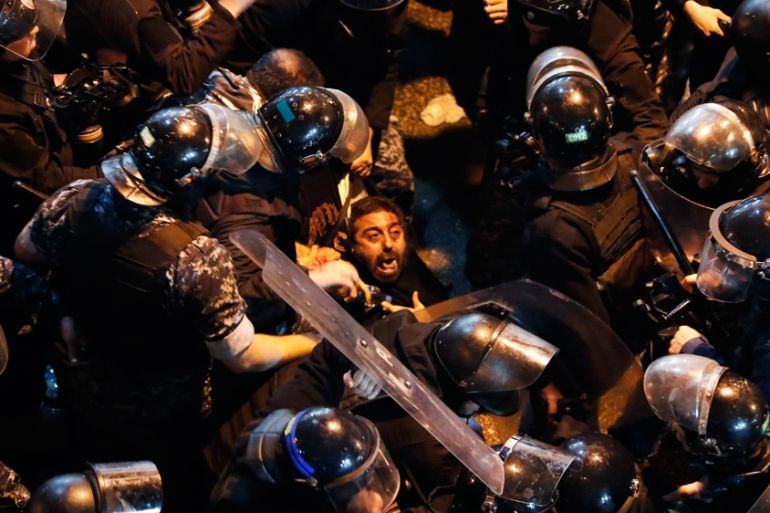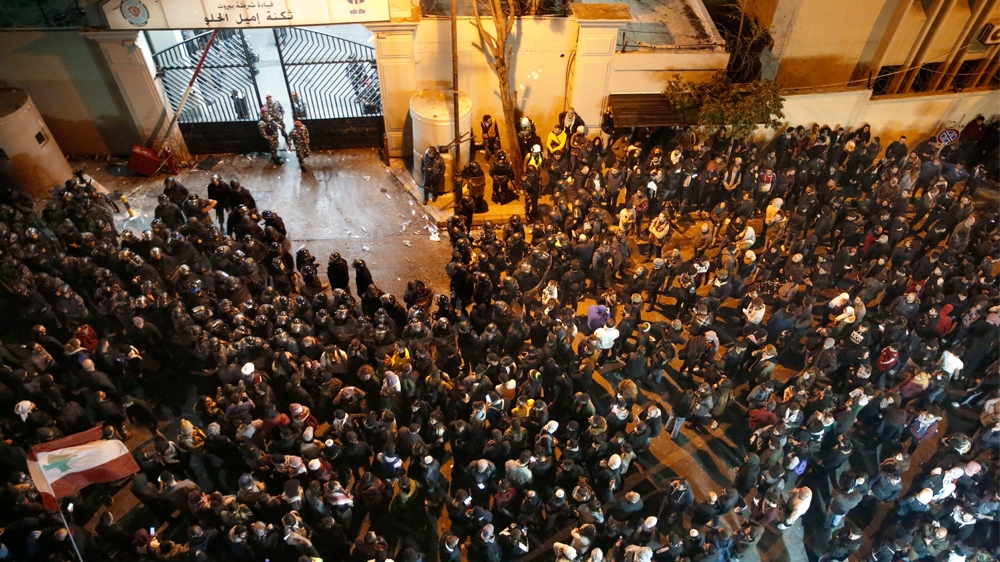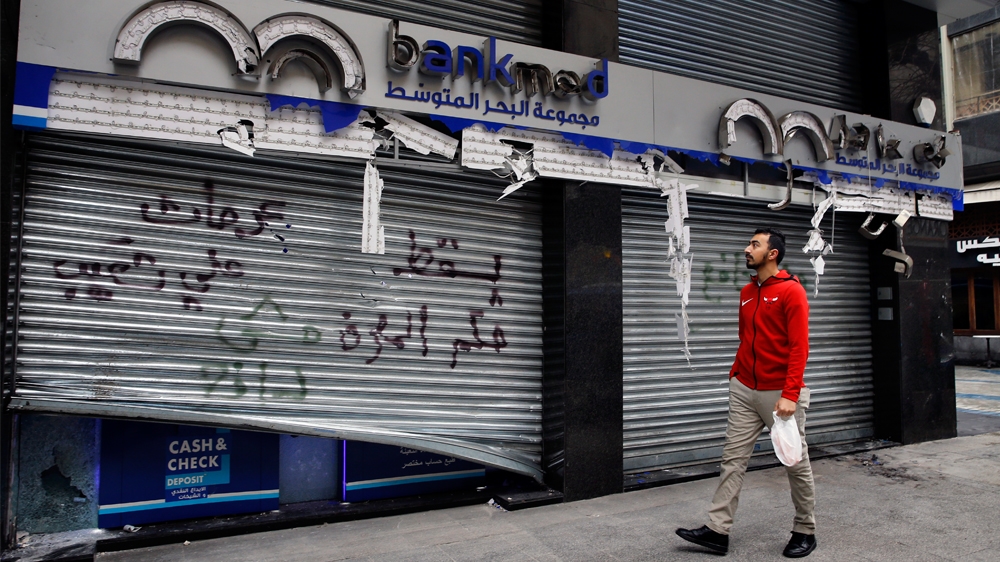Security forces fire tear gas in second night of Lebanon clashes
Months into the mostly peaceful protest movement, anti-gov’t demonstrators turned their anger onto the banks.

Protesters in crisis-hit Lebanon clashed with security forces in Beirut, a day after demonstrators outraged by restrictions on dollar withdrawals attacked bank branches with metal rods, fire extinguishers and rocks.
Hundreds gathered again outside the central bank on Wednesday evening, moving to a police station where more than 50 people were still detained following clashes between demonstrators and security forces the previous night.
Keep reading
list of 3 itemsFrustrations grow over bank restrictions in Lebanon
Lebanon slaps travel ban on Ghosn
On Tuesday and Wednesday, police with batons and tear gas wounded and arrested dozens as protesters lit fires and smashed bank facades and ATMs.
“These past two nights, they [police] were really barbaric,” said Cynthia Sleiman, a charity worker and protester who ended up in hospital after the violence.
“I had just arrived and was looking for my friends when the policeman grabbed me, hitting me on the head and neck. I fell to the ground and blood was streaming out,” she said.
Protesters chanted slogans and demanded the release of their comrades before security forces fired tear gas to disperse them.
Three months into a mostly peaceful protest movement against Lebanon’s political class, which led to the resignation of the government in late October, demonstrators have turned their anger on to the banks, many of which have imposed informal capital controls to stave off a liquidity crunch.
That has trapped the savings of depositors in Lebanon’s worst economic crisis since the 1975-1990 civil war.
Protester Yumna Mroue, 22, said the central bank’s financial policies had been harming small savers for years.
“We’re in free fall now. What happened last night comes from people’s real pain and anger,” she told AFP news agency.
“People are demanding a government that will save the economy. Instead, what politicians have been doing is bickering amongst themselves over seats in the next cabinet.”

‘A lot of anger’
Lawyers on Thursday told AFP news agency that Lebanon’s security forces were holding at least 100 anti-government protesters, after two nights of demonstrations that turned violent in Beirut.
“The total number of people arrested now tops 100, it’s madness,” said Nizar Saghieh, who heads the Legal Agenda non-government organisation.
Rights group Amnesty International said Lebanon’s internal security unit used excessive and unlawful force against protesters.
“What we have witnessed in the past couple of days is an alarming attack on freedom of assembly and expression,” Amnesty’s Middle East Director of Research Lynn Maalouf said in a statement.
“Security forces brutally beat protesters, dragging them on the street into the police station, verbally and physically abusing them. They also fired significant amounts of tear gas in residential areas.
“Acts by a minority of protesters who vandalised banks or threw stones is never a justification for such excessive use of force and sweeping arrests by law enforcement,” she added.
A new demonstration was planned on Thursday to demand the release of those held.
Security forces had released 10 people out of more than 50 who were detained on Tuesday night, according to local media and activists.
The Lebanese Red Cross said a total of 47 people were injured on Wednesday night, 37 of whom were taken to nearby hospitals. The 10 others were treated on the spot.
On Wednesday morning in the capital’s Hamra neighbourhood, many bank branches were left with smashed windows, destroyed ATMs and graffiti-daubed walls after violent protests the previous night.

Banks opened despite the wreckage, as cleaners scrubbed paint off walls and workers replaced smashed windows.
“There is a lot of anger,” Alia, a passer-by, told AFP. “You have to go to the bank twice to withdraw just $200.”
Reporting from Beirut, Al Jazeera’s Zeina Khodr said the atmosphere on the streets was tense.
“This country is without a government. There has been a political vacuum since the end of October,” she said.
“Instead, what politicians have been doing is bickering amongst themselves over seats in the next cabinet.”
Deposits ‘held hostage’
On Wednesday evening, hundreds of demonstrators gathered in front of the central bank, whose governor Riad Salameh they partly blame for the country’s financial crisis.
Security forces, meanwhile, imposed tight movement restrictions in Hamra, closing the main road to the central bank.
The state-run National News Agency reported that some tear gas canisters had fallen inside the Russian embassy, near the police station housing the detainees.
Activists said several people including at least one video journalist had been injured in the clashes.
|
|
Since September, banks have limited the number of dollars customers can withdraw or transfer abroad, in a country where the US currency and the Lebanese pound are used interchangeably.
Although no formal policy is in place, most lenders have limited withdrawals to about $1,000 a month, while others have imposed tighter curbs.
Prompted by a grinding liquidity crisis, the controls are increasingly forcing depositors to deal in the pound.
But the local currency has plunged by over a third against the dollar on the parallel market, hitting almost 2,500 Lebanese pounds against the US dollar over the past week.
The official rate was pegged at 1,507 Lebanese pounds to the dollar in 1997.
Demonstrators accuse banks of holding their deposits hostage while allowing politicians, senior civil servants and bank owners to transfer funds abroad.
The central bank has announced it is investigating capital flight, saying it wants to standardise and regulate the ad hoc banking restrictions.
‘Dangerous chaos’
Compounding the situation, debt-burdened Lebanon has been without a government since Saad Hariri resigned as prime minister on October 29 under pressure from the anti-government protests.
Its under-fire politicians have yet to agree on a new cabinet despite the designation last month of Hassan Diab, a professor and former education minister, to replace Hariri.
|
|
Diab has pledged to form a government of independent experts – a key demand of protesters – but said last week that some parties were hindering his attempts.
Authorities on Wednesday condemned the night-time attacks and called for perpetrators to be prosecuted.
Hariri called the rampage “unacceptable,” while the parliamentary speaker, Nabih Berri, questioned whether the aim was to “destroy the country”.
But in a strongly-worded statement, the United Nations envoy to Lebanon, Jan Kubis, blamed politicians for the turmoil, accusing them of inaction while they watched the economy “collapse”.
“Politicians, don’t blame the people, blame yourselves for this dangerous chaos,” he said.